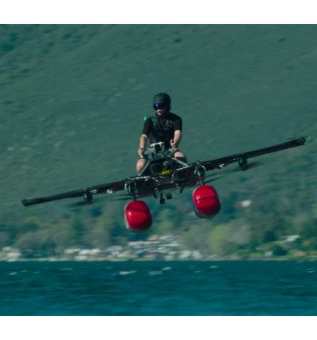| Udacity Launches Flying Car Nanodegree Program |
| Written by Sue Gee | |||
| Tuesday, 19 September 2017 | |||
|
During his keynote today at Disrupt 2017 taking place in San Francisco, Sebastian Thrun is announcing two new programs related to his enduring interest in self-driving cars and a new partnership with Lyft, which will fund 400 scholarships.
It was at the DLD conference held in Munich in 2012 that Sebastian Thrun announced that he was giving up teaching face-to-face in order to co-found Udacity and create free online courses that would reach hundred of thousands of students. If you want to be reminded of the history see Sebastian Thrun Resigns from Stanford to Launch Udacity. Apart from courses no longer being free the Udacity venture has worked out well so far, despite the misgivings I voiced at the time. Looking back to Udacity's earliest days, one of the two inaugural classes was CS373: Programming a Robotic Car taught by Thrun himself. CS373, which is at Advanced level is still available and is still free and now called Artificial Intelligence for Robotics and is useful material for Udacity's Self Driving Car Engineer Nanodegree, a program which has been running almost a year and is targeted at seasoned software engineers. By contrast the first of the two new Nanodegrees announced today, Intro to Self-Driving Cars, is for those with minimal programming experience:
According to Thrun's blog post during the 4-month program: We empower you to understand the essentials of programming a self-driving car: from machine learning to object-oriented programming to probabilistic robotics. When you graduate from this program with your very own Nanodegree credential in hand, you won’t quite be an expert (yet). However, you will have experienced what it means to build self-driving cars, and hopefully will engage in a path of learning that will forever change your life. Students who complete this introductory program will get guaranteed admission into the advanced Self-Driving Car Engineer Nanodegree program which so far has enrolled 10,000 students from 42,000 applications. Although the first group of 400 students haven't yet graduated, 60 of them have already gotten jobs at companies that are Udacity hiring partners, including BMW, NVIDIA, Lockheed, and Bosch. The latest partner for the Nanodegree program is Lyft Level 5 Engineering Center. Ridesharing company, Lyft, is based in San Fransico and is funding 400 scholarships for students who might otherwise be unable to afford it and promote diversity by including women and ethnic minorities. Raj Kapoor, Chief Strategy Officer at Lyft, stated: “At Lyft, our mission is to improve lives through the world's best transportation but we can't do that unless the best and brightest from all perspectives are given the opportunity to contribute. We have long admired Udacity's commitment to the democratization of education and are thrilled to offer scholarships for this new self-driving program to communities that are underrepresented in technology."
The other new offering, which is expected to start next year, is concerned with more futuristic autonomous vehicles. Nicholas Roy, Professor of Aeronautics and Astronautics at MIT and a member of CSAIL who is taking the lead in developing it, writes on the Udacity blog: The idea of a ‘Flying Car” is metaphor for a new vision for the future of smart transportation. In launching a Flying Car Nanodegree program, our goal is to teach a new generation of engineers the skills necessary to build this smart transportation future. We want to teach students to push beyond the current generation of quadrotors and remote-controlled drones, and give them the skills to create autonomous flight vehicles that will be crucial to the transportation systems of the future. Our curriculum will initially focus on the basics of autonomous flight including motion planning, state estimation, control, and perception. But over the course of two terms, students will gain an understanding of the bigger picture of autonomous flight as part of the air transportation system, and especially the challenges of safe and reliable autonomous flight. They will develop skills in systems integration through hands-on projects that include both flight simulation and the option to deploy code on a small drone. Our students will develop the software skills and conceptual understanding necessary to build a flight system for an autonomous flight vehicle that can reliably complete complex missions in urban environments. In this trailer for Sebastian Thrun expresses his firm conviction that the future of personal transportation is in the air. Thrun is also CEO of Kitty Hawk, the startup funded by Larry Page to make the idea of personal flight a reality, Its first vehicle, Flyer unveiled in April 2014, makes an appearance at the end of the video, which also gives some idea about what to expect in the new nanodegree:
It seems very fitting that this program was announced at the Disrupt conference.
More InformationIntro to Self-Driving Cars Nandegree Related ArticlesUdacity's Self-Driving Car Engineer Google Offers More Udacity Scholarships
To be informed about new articles on I Programmer, sign up for our weekly newsletter, subscribe to the RSS feed and follow us on Twitter, Facebook or Linkedin.
Comments
or email your comment to: comments@i-programmer.info |
|||
| Last Updated ( Thursday, 25 January 2018 ) |




